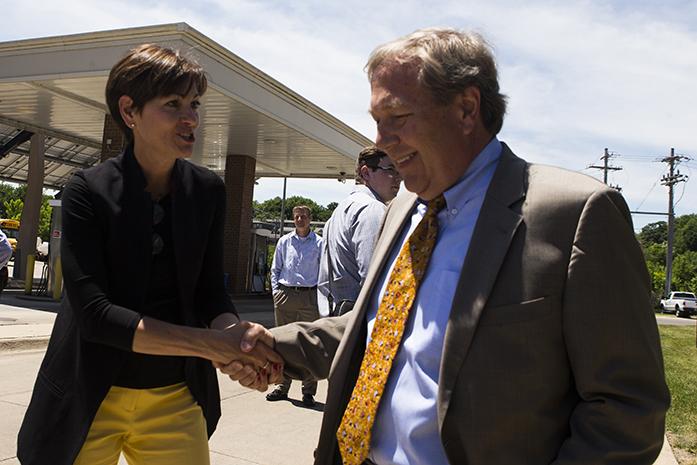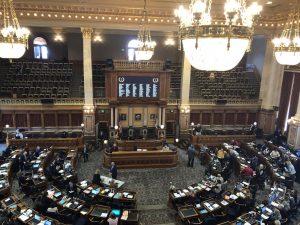After consistent budget cuts, Reynolds proposes funding boost for Iowa regent universities
The UI is slated to receive an extra $7 million in funding for fiscal 2020 if the Legislature approves Gov. Kim Reynolds’ proposal.
Iowa Gov. Kim Reynolds shakes hands with UI President Bruce Harreld after a visit on the UI campus to learn about diversifying biomass fuel sources on at the Cambus Maintenance Facility on Wednesday, June, 7, 2017.
January 15, 2019
DES MOINES — The University of Iowa may see $12 million of increased funding to the university general fund by fiscal 2021, according to Gov. Kim Reynolds’ fiscal 2020-2021 budget proposal released Jan. 15.
Reynolds’ budget request includes increased funding for the state Board of Regents universities — Iowa State University, the UI, and the University of Northern Iowa — totaling $18 million in fiscal 2020. The UI and ISU would each see an extra $7 million and UNI an extra $4 million in their budgets.
The UI received $211.6 million in general funding in fiscal 2018 and is estimated to receive $214.7 million in fiscal 2019.
Regent Executive Director Mark Braun released a statement following the unveiling of the budget, noting that the regents support Reynolds’ recommendation.
“The governor’s budget supports many of the board’s top initiatives,” Braun wrote in a statement. “With this level of funding, our universities can continue to provide the accessible, top-quality education that Iowa students deserve.”
RELATED: Will higher education remain accessible as funding becomes less public?
In total, higher education could see an increase in funding totaling $46 million in fiscal 2020. If the Legislature approves Reynolds’ recommendations, most of the funding would go to the regents. The remaining funds are set to be appropriated to the state’s community colleges and the College Student Aid Commission.
Last session, the Legislature cut $10.9 million from the regents’ budget to be equally split between ISU and the UI. The UI responded with a construction-project moratorium, which ended in September 2018, and the closing of or reduced funding for several UI programs.
Freshman Sen. Zach Wahls, D-Coralville, said he hopes the new Legislature will prioritize education this session.
“We saw some midyear budget cuts last year that I thought were disastrous,” Wahls said. “We got to make sure that doesn’t happen again this year.”
RELATED: Iowa Legislature sends funding cuts aimed at UI, ISU budgets to Gov. Reynolds
Wahls serves on the Senate Education Committee and is a ranking member on the education appropriations joint subcommittee. He said he will work to address affordability of education for students.
“I went to the University of Iowa, and I chose Iowa because it was an affordable option for a high-quality education,” Wahls said. “That’s what we’re known for, and we have to protect that.”
Sen. Joe Bolkcom, D-Iowa City, said he was unsure how well legislators will cooperate in the new session.
“I think at this point, it remains to be seen kind of how things are going to go, he said. “We’ve had a couple really turbulent years preceding these with Republicans in charge.”
UI President Bruce Harreld told The Daily Iowan in December 2018 that after the state found new resources last year but didn’t restore the entirety of the cuts made to regent institutions, he and others did not readily believe the state would increase its appropriation — even in light of the economic strength GOP politicians have touted.
“I think we’ve got a point of view that the institutions of higher education are an expense to be cut, they’re not an asset to be invested in. I’ve been pretty vocal over three years saying I think that’s wrong-headed,” he said. “I think we can do better for the economy, I think we’re a major driver of the economy, and as we cut it, it has a negative impact.”
RELATED: Iowa regents’ multiyear tuition model ‘better for students,’ UI president says
Despite the proposed increase in funding, students will likely pay more in tuition over the next five years. In November, the regents announced resident undergraduate tuition rates at ISU and the UI could increase by 3 percent if appropriation requests are funded or up to roughly 5 percent if requests are not funded.
“When the state doesn’t uphold its part of the bargain, tuition for students is where the money comes from,” Bolkcom said.






